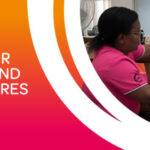Good nutrition on a budget
With the ever-increasing cost of living, you’ve most likely felt the proverbial ‘pinch’ in recent months. Every time you go shopping, the prices of basic grocery items have gone up again. Which means going without some things.
Unfortunately, that can affect our diet. Because it’s tempting to stock up on more affordable carbs – bread, rice, potatoes, maize meal and pasta – that satisfy hunger but don’t provide all the nutrition our bodies need to stay healthy.
Balanced diet
It’s important to eat a balanced diet with items from all five food groups: starch, protein, fat, fruit and vegetables, and dairy.
Most food items belong to more than one group. For example, meat and nuts contain both protein and fat, as do dairy products like cheese. Fruit and veg contain starch and fibre. By combining a variety of more affordable foods, you can ensure good nutrition on a budget.
Protein options
Protein is the body’s building block – essential for maintaining healthy muscles and bones and repairing tissue. Most people associate protein with meat. And even chicken, the cheapest meat, is becoming unaffordable for many.
If you’re on a budget but still want to include meat in your diet, consider buying organ meat – liver, kidney, heart and tripe. These cost way less than steak, but liver, in particular, is one of the most nutrient-dense foods on the planet.
If you haven’t eaten organ meats before, you’ll need to learn how to prepare and cook them in ways you enjoy.
What other proteins are there that ensure good nutrition on a budget?
Eggs contain 6-7 grams of protein depending on their size. They’re also a good source of other nutrients, including vitamin D (essential for healthy bones and a strong immune system) and choline (which helps metabolism and liver function).
Unfortunately, eggs are also known for their high cholesterol content. But whether or not they pose a risk is still to be proved. A recent study on the effect of a high-egg diet on people with type 2 diabetes revealed that their diet did not increase the risk of cardiovascular disease.
Fish – Canned pilchards are high in Omega 3 fatty acids, as well as being an excellent source of vitamin D, vitamin B12, calcium, iron and zinc. Canned tuna is another option, although it is more expensive than pilchards.
Beans – Canned black beans, baked beans, kidney beans, chickpeas and lentils are all fantastic sources of protein, as well as fibre for healthy bowels.
Oats have more protein than most other grains – 17 grams per 100g serving. Although they don’t contain all nine of the essential amino acids of other proteins, they are still considered a good option, especially since they are high in fibre. Choose raw, unsweetened oats and add your own flavour with a little sugar, honey, salt or chopped fruit.
Pumpkin seeds are much more affordable than nuts. Yet they offer the same rich source of protein, unsaturated fat, vitamins and minerals – including iron, zinc and magnesium. These nutrients help reduce the risk of chronic diseases, including cancer and heart disease.
Fruit and vegetables
Plant foods contain important vitamins and minerals that help prevent disease, as well as fibre to keep the bowels healthy. For good nutrition on a budget, go for locally grown fresh produce that’s in season.
Many stores offer strawberries and avocados all year round, but you’ll pay more for imported items. You also pay more for fruit and veg that is pre-prepared – i.e. peeled or sliced.
Bananas – Even at today’s prices, you can buy a banana for just R3. In return you get a satisfying portion of healthy carbs, potassium, fibre, antioxidants and vitamins, particularly B3, B6 and B12. Bananas are a great source of energy and also easy to digest.
Beetroot – A bunch or bag of these nutrient rich vegetables costs as little as R18. Beets have very few calories and zero cholesterol. But they’re packed with vitamins A and C, magnesium and folate. So, they’re great for ensuring healthy nutrition on a budget.
Grate raw beetroot into salads for extra colour and goodness. If you prefer them cooked, the options are unlimited. Roast, bake, grill, boil, steam or microwave them. You can even turn them into beetroot ‘crisps’ by slicing thinly, and cooking them in an airfryer (if you have one). Or lightly coating them in oil and baking them in the oven. All at a fraction of the price you’ll pay in the stores for this healthy snack!
Spinach – The superstar of leafy green vegetables, spinach is one of the best sources of plant-based iron available. It’s also full of other minerals and vitamins, including vitamin K, which the body needs for blood clotting, helping wounds to heal, and keeping bones healthy. Use it in salads in place of more expensive lettuce leaves. Or add chopped spinach to soups, stews and stir-fries.
By adding these items to your diet, not only will your body thank you, but so will your wallet. You can enjoy good nutrition on a budget. Eating healthy doesn’t have to cost more … in fact, it often costs less.
If you can’t afford to buy enough food
Even these low cost items may be beyond the reach of elders trying to make ends meet on a government grant of just R2 100 per month.
Tafta’s meal delivery service provides nutritionally balanced, pre-cooked meals for elders, delivered to your door. The cost of the service is on a sliding scale, based on individuals’ circumstances.
To find out more, please contact the Intake Social Worker on 031 332 3721 or email intake@tafta.org.za.






 Vote for us in the KZN Top Brand Award
Vote for us in the KZN Top Brand Award Men’s health – signs older men shouldn’t ignore
Men’s health – signs older men shouldn’t ignore Tafta commemorates Elder Abuse Awareness Day – staff say ‘No’ to elder abuse
Tafta commemorates Elder Abuse Awareness Day – staff say ‘No’ to elder abuse Elder Abuse – it’s not always what you think
Elder Abuse – it’s not always what you think Holiday fun that doesn’t break the bank – inexpensive activities for grandparents
Holiday fun that doesn’t break the bank – inexpensive activities for grandparents Old school ‘Granny Crafts’ promote mental health
Old school ‘Granny Crafts’ promote mental health Tafta Golf Day at Cotswold, a swinging success!
Tafta Golf Day at Cotswold, a swinging success! Come visit us – Tafta Open Days this May!
Come visit us – Tafta Open Days this May! Sleep Quantity vs. Sleep Quality – what matters most for healthy ageing?
Sleep Quantity vs. Sleep Quality – what matters most for healthy ageing? Thank you for being an angel in disguise
Thank you for being an angel in disguise